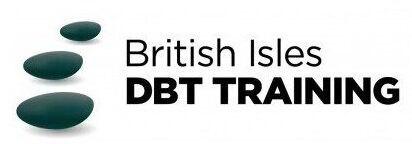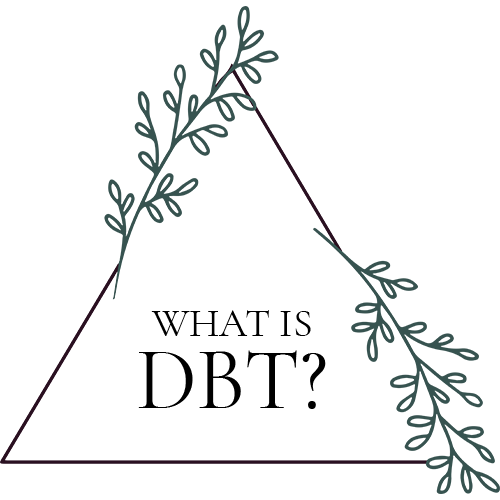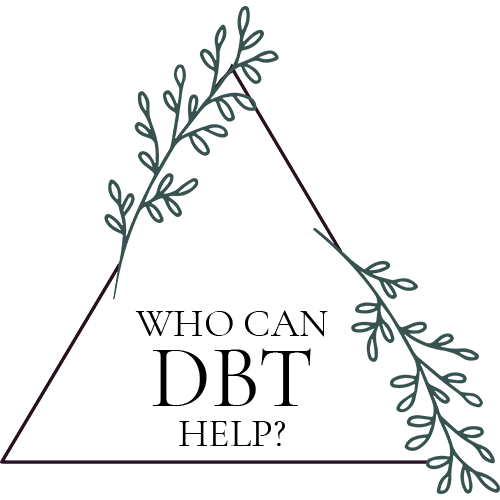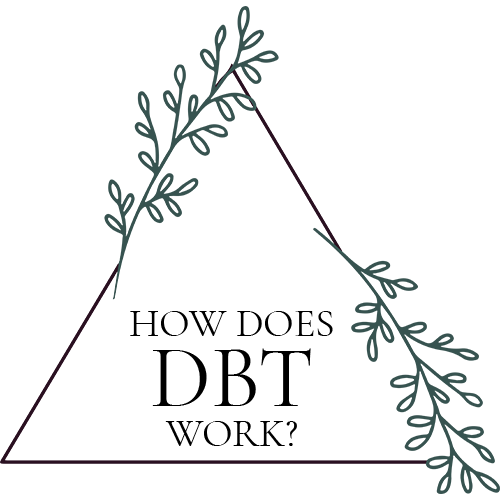
Online DBT
What Is Online DBT Therapy?
Discover how DBT is effective in treating BPD and other behavioural disorders online







WHAT IS DBT?
DBT is a cognitive behavioural therapy created specifically for BPD by Marsha Linehan, which draws on the idea of the dialectic, which is the study or inquiry into opposites. Dialectical strategies support both therapist and patient, to synthesise views and become unstuck from extremes, which are inherent in BPD.
Goals are also vital in DBT treatment planning, in ensuring that the symptoms are targeted. The behavioural aspect involves assessing and targeting behaviours, in order to solve problems through teaching the client skills which helps them reach these goals. However, it’s important to note that in helping clients develop a life they see as worth living, the therapist needs to help them work to the goals defined by them.
DBT usually involves group skills training, individual therapy sessions and crisi skills coaching.

WHO CAN IT HELP?
It is often particularly helpful for the diagnosis of BPD. DBT is the gold standard treatment for people with a diagnosis of Borderline Personality Disorder (BPD) and Emotionally Unstable Personality Disorder. In fact, the people who we treat within our service experience immense changes to their life by treatment end, which at treatment start, they are unable to envisage. Yet in order to get there, the specific treatment model is required.
DBT is also useful for people struggling with emotional regulation or are exhibiting self-destructive behaviours such as substance misuse, binge eating and more. DBT is highly effective in treating adolescents.
DBT has a vast evidence base for BPD (Linehan et al., 1991; Linehan et al., 2006; Linehan et al., 2015).

HOW DOES IT WORK?
DBT is a therapy designed to help you change patterns of behaviour that are not effective, such as self-harm, suicidal thinking and substance abuse. The approach works towards helping you increase your emotional and cognitive regulation by learning about the triggers that lead to reactive states.
It also helps you to assess which coping skills to apply in the sequence of events, thoughts, feelings and behaviours that lead to the undesired behaviour.
Having offered DBT in the NHS, private hospitals and private individuals following Intensive DBT training with British Isles DBT, the team have a wealth of experience and great success rates in treating BPD and other behaviours using DBT.
DBT is a form of cognitive behavioural therapy designed to help people regulate emotions, manage distress and develop healthier coping strategies.
DBT helps to:
Originally developed to treat borderline personality disorder (BPD), DBT has since been adapted and proven effective in treating a range of conditions, including ADHD, anxiety, depression, PTSD and more. Research shows that DBT can benefit those from all backgrounds, regardless of race, age or sexual orientation.
While many still believe that in-person therapy is the only way to get effective treatment, online therapy is rapidly growing in popularity. In fact, research shows that online DBT is just as effective as face-to-face sessions, making expert support more accessible than ever before.
If you’ve been searching for DBT therapy near you, our team at Online is here to help wherever you are. We take the time to truly understand each individual’s needs, ensuring you receive the best treatment for your specific situation.
Still unsure if DBT is right for you? If you’re considering trying DBT therapy in the UK, here are just a few of the benefits you could experience…

Research shows that Dialectical Behaviour Therapy (DBT) is one of the most effective treatments for Borderline Personality Disorder (BPD). It’s successful in managing suicidal thoughts, reducing self-harm and developing healthier coping mechanisms.
One study found that over 75% of people diagnosed with BPD who completed DBT no longer met the diagnostic criteria for the disorder after just one year of treatment. This makes DBT the gold standard treatment for emotional dysregulation and impulsive behaviours.
Our experienced team has a proven track record and very high success rate in treating BPD. We offer DBT skills group training, weekly one-to-one therapy and crisis coaching. Every treatment plan is tailored to the individual, ensurin gyou get the support you need.

Research shows that Dialectical Behaviour Therapy (DBT) is one of the most effective treatments for Borderline Personality Disorder (BPD). It’s successful in managing suicidal thoughts, reducing self-harm and developing healthier coping mechanisms.
One study found that over 75% of people diagnosed with BPD who completed DBT no longer met the diagnostic criteria for the disorder after just one year of treatment. This makes DBT the gold standard treatment for emotional dysregulation and impulsive behaviours.
Our experienced team has a proven track record and very high success rate in treating BPD. We offer DBT skills group training, weekly one-to-one therapy and crisis coaching. Every treatment plan is tailored to the individual, ensurin gyou get the support you need.

Self-harm and suicide ideation are closely linked to severe mental conditions, including Emotionally Unstable Personality Disorder (EUPD), eating disorders and depression.
Research shows that therapies with skills training (like DBT) are more effective at reducing suicidal thoughts and self-harming behaviours than those without. DBT helps individuals develop healthy coping mechanisms, improving emotional regualtion and distress tolerance.
At Online DBT, we aim to give hope and practical support to those struggling with overwhelming thoughts. While some people recognise clear triggers for these feelings and dark thoughts, others often may not fully understand why they experience them. Regardless of the cause, DBT equips you with the tools to navigate these emotions and regain control.
Self-harm and suicide ideation are closely linked to severe mental conditions, including Emotionally Unstable Personality Disorder (EUPD), eating disorders and depression.
Research shows that therapies with skills training (like DBT) are more effective at reducing suicidal thoughts and self-harming behaviours than those without. DBT helps individuals develop healthy coping mechanisms, improving emotional regualtion and distress tolerance.
At Online DBT, we aim to give hope and practical support to those struggling with overwhelming thoughts. While some people recognise clear triggers for these feelings and dark thoughts, others often may not fully understand why they experience them. Regardless of the cause, DBT equips you with the tools to navigate these emotions and regain control.


While much of the research on DBT has focused on its success in treating BPD, self-harm and suicidal thoughts, studies now show that DBT is also effective for individuals with other psychological disorders.
Research highlights that DBT can be beneficial for those struggling with:
Online DBT offers treatment to help a range of emotional and behavoiural challenges.
If you’re unsure whether DBT is right for you, simply contact us; just let us know what you’re going through, and we can find the best approach for your needs.

While much of the research on DBT has focused on its success in treating BPD, self-harm and suicidal thoughts, studies now show that DBT is also effective for individuals with other psychological disorders.
Research highlights that DBT can be beneficial for those struggling with:
Online DBT offers treatment to help a range of emotional and behavoiural challenges.
If you’re unsure whether DBT is right for you, simply contact us; just let us know what you’re going through, and we can find the best approach for your needs.

Mindfulness is a core component of DBT, helping you develop awareness and acceptance of the present moment. It’s about letting go of past regrets and future worries, allowing you to concentrate entirely on the here and now without judgment.
This creates a pause between intense emotions and your response, giving you the space to choose a healthier coping strategy instead of reacting impulsively. While it takes practice, you’ll soon be able to manage distress, regulate emotions and respond more effectively to challenging thoughts and feelings.

Mindfulness is a core component of DBT, helping you develop awareness and acceptance of the present moment. It’s about letting go of past regrets and future worries, allowing you to concentrate entirely on the here and now without judgment.
This creates a pause between intense emotions and your response, giving you the space to choose a healthier coping strategy instead of reacting impulsively. While it takes practice, you’ll soon be able to manage distress, regulate emotions and respond more effectively to challenging thoughts and feelings.

Many people struggle to cope with unpredictable emotions, leading to impulsive behaviours or self-harm as a coping mechanism. Distress tolerance skills help you recognise uncertainty and the anxiety that comes with it – without resorting to harmful coping mechanisms.
Mindfulness plays a key role in distress tolerance. By creating a pause between your thoughts and actions, you gain the ability to respond to emotional discomfort in a healthier way. Through DBT, we’ll help you develop the skills to recognise, accept and work through distressing emotions, so you can navigate life’s challenges with greater resilience.
Many people struggle to cope with unpredictable emotions, leading to impulsive behaviours or self-harm as a coping mechanism. Distress tolerance skills help you recognise uncertainty and the anxiety that comes with it – without resorting to harmful coping mechanisms.
Mindfulness plays a key role in distress tolerance. By creating a pause between your thoughts and actions, you gain the ability to respond to emotional discomfort in a healthier way. Through DBT, we’ll help you develop the skills to recognise, accept and work through distressing emotions, so you can navigate life’s challenges with greater resilience.


Many people who struggle with emotional regulation also experience communication difficulties, making it hard to express their feelings and needs. Interpersonal effectiveness skills help you develop clear, confident communication, teaching you how to say no with confidence, articulate your feelings and navigate relationships with greater ease.
By building these skills, you can strengthen your relationships, improve self-respect and feel more in control of your interactions with others.

Many people who struggle with emotional regulation also experience communication difficulties, making it hard to express their feelings and needs. Interpersonal effectiveness skills help you develop clear, confident communication, teaching you how to say no with confidence, articulate your feelings and navigate relationships with greater ease.
By building these skills, you can strengthen your relationships, improve self-respect and feel more in control of your interactions with others.

Regulating emotions can be challenging, but DBT teaches you that even negative feelings are temporary. Emotional ups and downs can sometimes lead to impulsive reactions and harmful behaviours, but learning to recognise and manage these emotions can help you break this cycle.
By gaining control over your emotions, you no longer feel the need to react to every difficult feeling. Instead, you’ll develop the ability to pause, assess, and choose a healthier way forward.
Regulating emotions can be challenging, but DBT teaches you that even negative feelings are temporary. Emotional ups and downs can sometimes lead to impulsive reactions and harmful behaviours, but learning to recognise and manage these emotions can help you break this cycle.
By gaining control over your emotions, you no longer feel the need to react to every difficult feeling. Instead, you’ll develop the ability to pause, assess, and choose a healthier way forward.


If you’re struggling with BPD, depression, ADHD, stress or anxiety, you don’t have to go through it alone. Whether you’re suffering from emotional instability, suicidal thoughts or self-harm, help is at hand.
At Online DBT, we’ll teach you the practical skills you need to manage negative emotions, regain control and improve your daily life.
Looking for ‘DBT therapy near me’? Call us today on 0203 432 5909 to learn more about our treatment options and how we can help.

If you’re struggling with BPD, depression, ADHD, stress or anxiety, you don’t have to go through it alone. Whether you’re suffering from emotional instability, suicidal thoughts or self-harm, help is at hand.
At Online DBT, we’ll teach you the practical skills you need to manage negative emotions, regain control and improve your daily life.
Looking for ‘DBT therapy near me’? Call us today on 0203 432 5909 to learn more about our treatment options and how we can help.

SPEAK TO OUR TEAM
Have questions? Start with a call to learn more about our DBT programmes, explore your options and book your initial assessment.

DBT ASSESSMENT
Schedule your one-hour online assessment via Zoom or VSee using our easy online booking system, or call our team to find a time that works for you.
Same-week appointments available.

DBT TREATMENT PACKAGE
Take the first step toward regaining control over your thoughts, emotions and behaviours with a personalised DBT treatment plan.
Ready to begin?
Dialectical behaviour therapy can be administered in all sorts of different ways in order to accommodate different needs, and all have been found to be effective. Below are the three primary forms of DBT:
INDIVIDUAL THERAPY
This involves one-to-one sessions between the patient and a trained professional. Here, the patient learns how to apply DBT skills to the challenges of their personal life.
GROUP THERAPY
BPD group therapy is where the same behavioural skills are taught in a group setting. While this is not a support group, participants benefit from learning and practising skills in a supportive atmosphere. It feels more like a classroom setting where we teach DBT skills.
PHONE COACHING
With DBT skills phone coaching, patients can contact their therapist to receive guidance and support in specific situations.
If you are thinking of attending a course on ‘DBT therapy near me’, it’s helpful to know how it will work. Clients tend to progress through the stages in order but can return to previous stages if needed to help address concerns that arise while undergoing therapy.
This occurs at the beginning of therapy, in which the therapist and client establish a working relationship.
The objective of this stage is to identify and address behaviours that are life-threatening or are disrupting the client’s life. If the client shows resistant behaviours to the therapy, such as not attending sessions or arriving late, these will also be tackled at this stage. Clients also start learning and then practising the skills they learn.

The term ‘dialectical’ derives from the notion that combining two opposing elements in therapy – namely, change and acceptance – results in better outcomes than attempting either one in isolation.
The focus in DBT on acceptance of the patient’s experience is what distinguishes it from other therapies. The DBT therapist acknowledges the client’s difficult thoughts, feelings, and emotions and works on strategies to help them change negative behaviours for positive ones.
Patients must commit to doing homework outside of sessions in order to perfect their new behavioural skills. This entails keeping a daily ‘diary card’ to record their emotions, urges, acts, and skills.
If you are looking for ‘DBT therapy near me’, why not book sessions through the Internet with the help of Online DBT?
We offer group skills training, 1-to-1 sessions and crisis coaching in DBT therapy UK-wide and will help tailor your learning experience directly to your needs and your condition.

The term ‘dialectical’ derives from the notion that combining two opposing elements in therapy – namely, change and acceptance – results in better outcomes than attempting either one in isolation.
The focus in DBT on acceptance of the patient’s experience is what distinguishes it from other therapies. The DBT therapist acknowledges the client’s difficult thoughts, feelings, and emotions and works on strategies to help them change negative behaviours for positive ones.
Patients must commit to doing homework outside of sessions in order to perfect their new behavioural skills. This entails keeping a daily ‘diary card’ to record their emotions, urges, acts, and skills.
If you are looking for ‘DBT therapy near me’, why not book sessions through the Internet with the help of Online DBT?
We offer group skills training, 1-to-1 sessions and crisis coaching in DBT therapy UK-wide and will help tailor your learning experience directly to your needs and your condition.
Want to find out more about DBT, or are you ready to book in an assessment?
We are here to help, so send us your details via the form attached, and we will get back to you with the information you need.
Want to read about DBT in the meantime, then check out our DBT brochure below.
Want to get straight in contact? Call us on our number below or send us an email and a member of our team will get straight back to you.
Phone
0203 432 5909ADDRESS
Suite 788
Unit 3A
34-35 Hatton Garden
Holborn
London
EC1N 8DX
UK